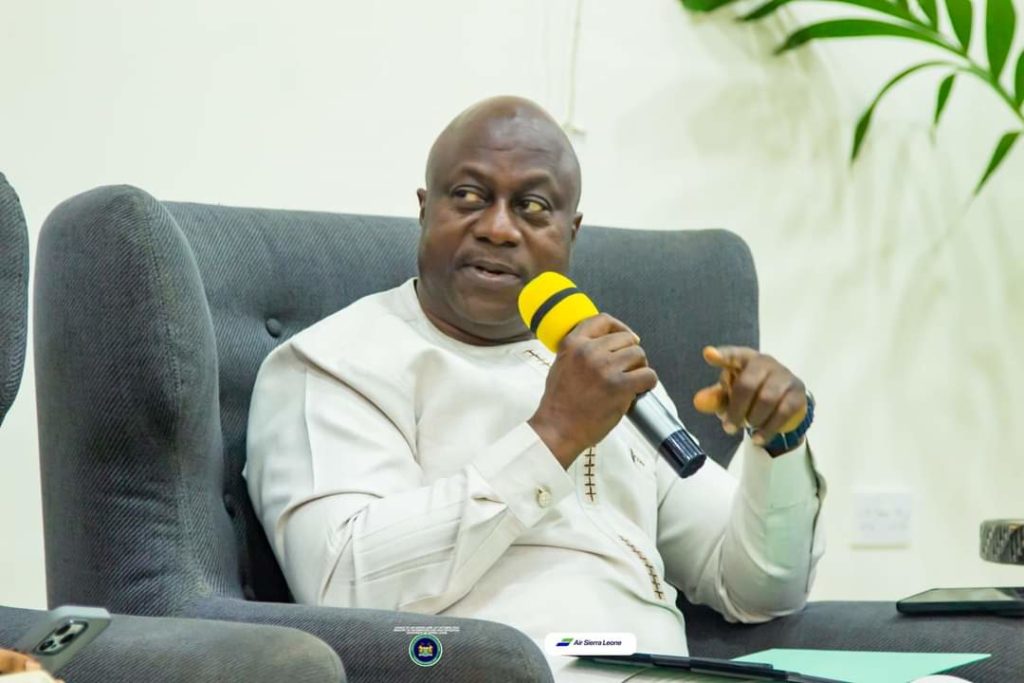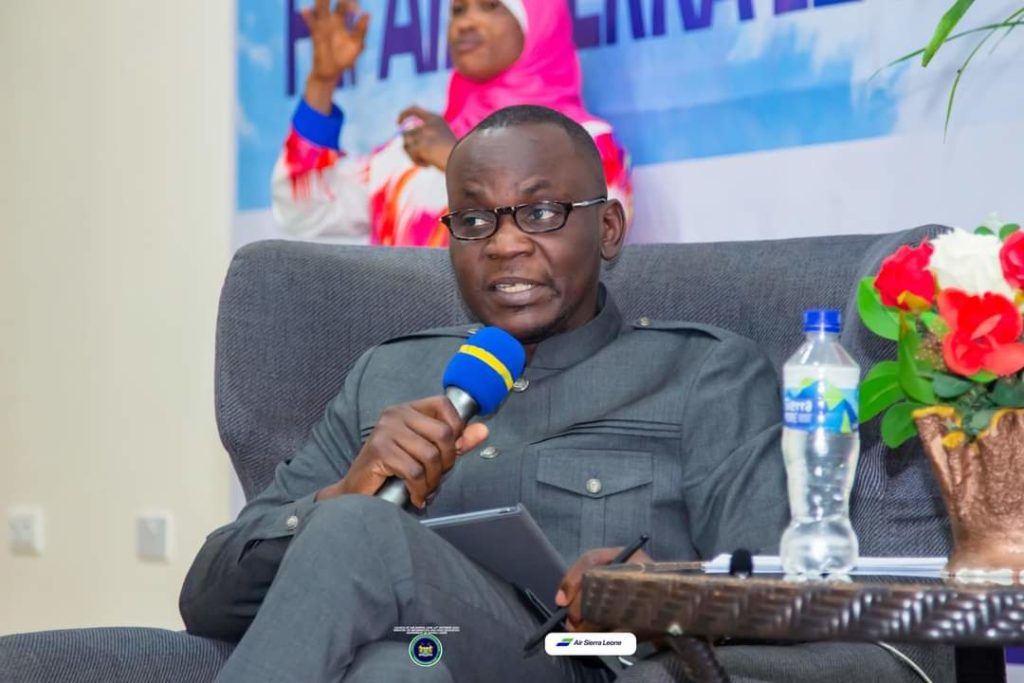By Kemo Cham
A new airline carrying the Sierra Leonean flag has been unveiled as the latest entrant into the country’s slow-growing aviation market.
Air Sierra Leone was introduced on Saturday by Transport and Aviation Minister, Alhaji Fanday Turay, who said that the privately owned airline is the result of ongoing reforms by the Bio administration aimed at enhancing the local business environment for foreign investment.
“This is a long process. Work on it had been on for long time. We had to resolve a lot of issues before coming to the public,” he told journalists at a press launch at New Brookfields Hotel in Freetown.
Both the government and management of the new airline stressed that Air Sierra Leone is just a flag carrier and not a national airline, as it is 100 percent privately owned.
Emmanuel Iza, who was introduced as Chief Executive Officer of the airline, outlined part of his business plan, whose goal is to make the Freetown International Airport in Lungi a hub in the sub region. He said they intend to achieve this in three phases, the first of which is to consolidate its presence in West Africa by linking the major cities of Accra, Lagos, Abuja, Banjul, Dakar, Monrovia, Conakry and Abidjan to Freetown.
The second phase, according to Iza, will link these cities to London, while the third will see the creation of a US route.
“Our mission is centred on one thing – connecting Sierra Leone to the world and to provide a world class airline…This brings a sense of hope to every Sierra Leonean. It brings a sense of unity among us,” he said.

Initially, Air Sierra Leone will fly passengers in and out of Freetown three times a week. Outbound flights are scheduled for Tuesdays, Thursdays and Saturdays to London Gatwick, departing at 10:40am for a 6-hour direct journey, while in-bound flights will be on Mondays, Wednesdays and Fridays, departing Gatwick at 10pm.
Tickets for the maiden flight are expected to go on sale on 18 October, with take-off scheduled for December 2.
Air Sierra Leone will be operated with technical support from Nigeria based Xejet, for which Mr Iza is also the CEO.
“Air Sierra Leone is not just a mere airline. It is a symbol of national pride,” the Nigerian aviation executive said, noting that the concept of this new airline is deeply rooted in bringing the Sierra Leone national flag back to the skies.
For the Sierra Leone government, the initiative presents a unique opportunity to transform the aviation sector, with the immediate aim of ending a nearly two decades European Union aviation safety blacklist on the Freetown International Airport.
Musayero Barrie, Director General of the Sierra Leone Civil Aviation Authority (SLCAA), said recent reforms within the sector positioned the country well to change its image internationally in terms of aviation safety. And Air Sierra Leone, she noted, is the first test case for this.
Sierra Leone earlier this year announced the opening of a national flight registry, allowing the country to receive and process applications Airline Operating Certificate, for the first time since 2008.
The regulatory agency said these two milestones are crucial steps towards a successful pending review by an EU safety agency.
Among the conditions for Sierra Leone to be removed from the EU safety blacklist is demonstration of effective processing of applications and management of the registry, said Barrie.
“This celebration of Air Sierra Leone has many implications. Besides the benefits of what they offer, we as the state will use this opportunity to leverage on our ambition to be removed from the EU safety list,” she said.
Air Sierra Leone is the latest in over 30 failed attempts at sustaining a national or flag carrier since independence. It comes at a period the market is characterised by mixed experiences.
Several reforms in the last decade and half, including the newly constructed Freetown International Airport, were supposed to turn things around in terms of revenues, which the current government insists is working. But the unexplained departures of some airlines from the scene within this period raises questions about this. Notable among these are Air Cote d’Ivoire and Fly Salone.
Some industry observers blame it on high operating cost of the airlines, which they say drive up the cost of air tickets.

The status of Air Senegal is in doubt after multiple delays and cancellations of its Freetown route recently led to a halt of its flights.
The SLCAA says it hasn’t received any official notification of the suspension of the route, but Barrie said there was a “huge” likelihood of the Senegalese flights not coming back.
But with the departure of those airlines, a few new ones either came in or are on the process of coming in, she said, citing Ethiopian as the latest entrant.
And for Mr Iza, as bad as this is for Air Senegal, it offers an opportunity for him and his investors.
“It is unfortunate to bring this out but when one door closes another one opens,” he said.
Initially, his plan was to work towards introducing the US route within six to 10 months of the Freetown launch. But he said this process might be fast tracked to take advantage of the void left by Air Senegal.
“A very good airport like what Sierra Leone has without a resident airline is not complete,” he said.























